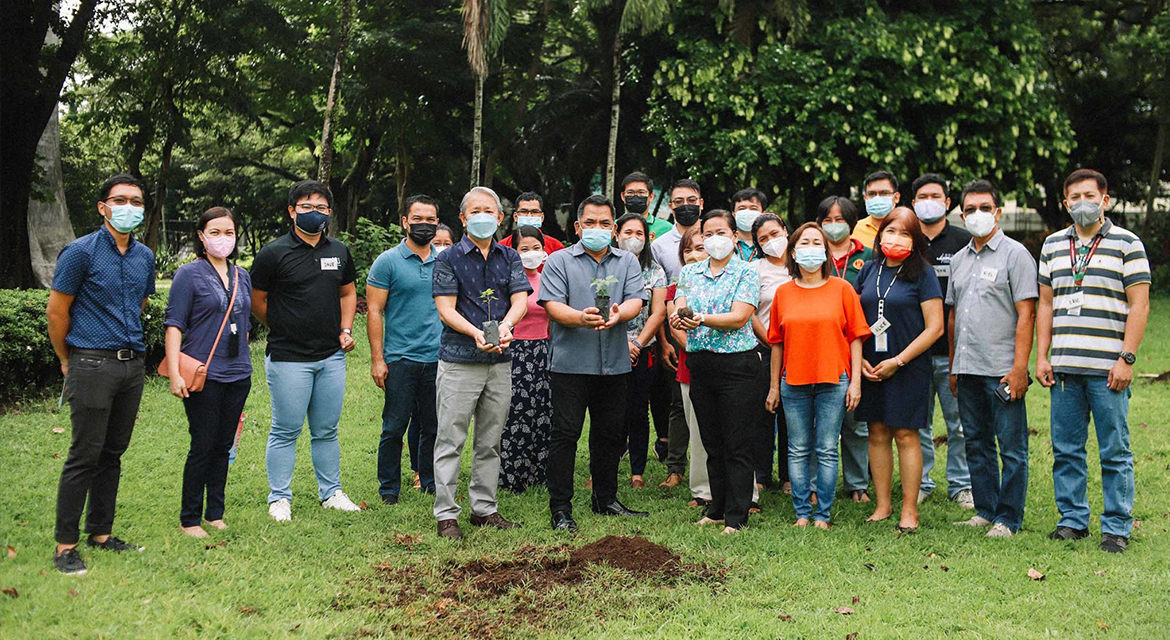Twenty-four new environmental stewards will now help fulfill UPLB’s commitment to protect the environment.
The UPLB Environmental Stewardship Committee (ESC) under the Office of the Vice Chancellor for Community Affairs (OVCCA) led a two-day training for the newly formed UPLB Corps of Environmental Stewards (CES) on June 29-30 at the Obdulia F. Sison Hall (OFSH).
To kick off the event, Chancellor Jose V. Camacho, Jr., Vice Chancellor for Community Affairs Roberto P. Cereno, and Assistant to the Vice Chancellor Benevieve D. Villanueva led a ceremonial tree planting with the CES in front of OFSH.
The tree planting was also held in commemoration of Philippine Environment Month. The seedlings planted are Crateva religiosa, locally known as Salingbobog, which is “the country’s native version” of Japan’s cherry blossom trees, according to Vice Chancellor Cereno.
In his opening remarks, Chancellor Camacho, Jr. thanked the ESC and OVCCA for spearheading the activity. He also thanked the new members of CES for accepting the challenge of protecting the environment and encouraged them to work together for greener and more sustainable ways of futureproofing the University.
“As corps of environmental stewards, you will become advocates and exemplars of best practices to maintain the integrity of the campus, particularly in the areas of waste-at-source segregation, hazardous waste management, and spearheading various initiatives to solve the environmental problems with your respective units,” he said.
Vice Chancellor Cereno, who is also the chair of ESC, led the first training lecture, which focused on UPLB’s overarching goals and action plans toward the effective and efficient stewardship of the University’s endowed natural resources. He underscored OVCCA’s role of overseeing and promoting UPLB’s overall compliance with environmental laws and regulations.
Likewise, he informed the CES of UPLB’s three Environmental Compliance Certificates (ECCs) awarded by the Department of Environment and Natural Resources-Environmental Management Bureau. These ECCs were secured for UPLB’s campus and technology parks.
The second lecture focused on the concepts and problems of human-centered environmental ethics and stewardship. It was led by Dr. Maria Victoria O. Espaldon of the School of Environmental Science and Management.
She challenged the CES to help the University “build a community with shared environmental ethics that is morally responsible to the neighbors and the environment.”
The third lecture oriented the CES about UPLB’s environmental programs and initiatives. Presented by two ESC members, the lecture was subdivided into two topics. The first was about waste-at-source segregation and solid waste management and was presented by Donny Ray D. Camus of the University Planning and Maintenance Office. The second part delved into hazardous waste management and was discussed by Christian Paulo C. Altoveros of OVCCA.
A workshop followed the first three lectures to help the CES identify the environmental issues in their respective colleges and units.
For the second day of training, Garry Jay S. Montemayor, faculty member at the College of Development Communication and ESC member, talked about CES’ roles, responsibilities, and functions. He also discussed conducting an environmental audit, which can be used as a guide in reviewing and monitoring environmental compliance.
After the lecture, the CES was tasked to develop and present their action plans as proposed solutions to the environmental issues they identified from the previous workshop. This will serve as a basis for enhancing UPLB’s proposed environmental guidelines.
An oath-taking ceremony immediately followed to recognize the significance of CES’ responsibilities and commitment to help UPLB promote and streamline its environmental initiatives.
To cap off the training, Assistant to the Vice Chancellor Villanueva gave the closing remarks and thanked the CES for their active participation. She ended her message by emphasizing the significance of leading efforts in environmental protection, especially as members of a premier university and science community. (Roi Mojado)
This article was originally published on the UPLB website.

